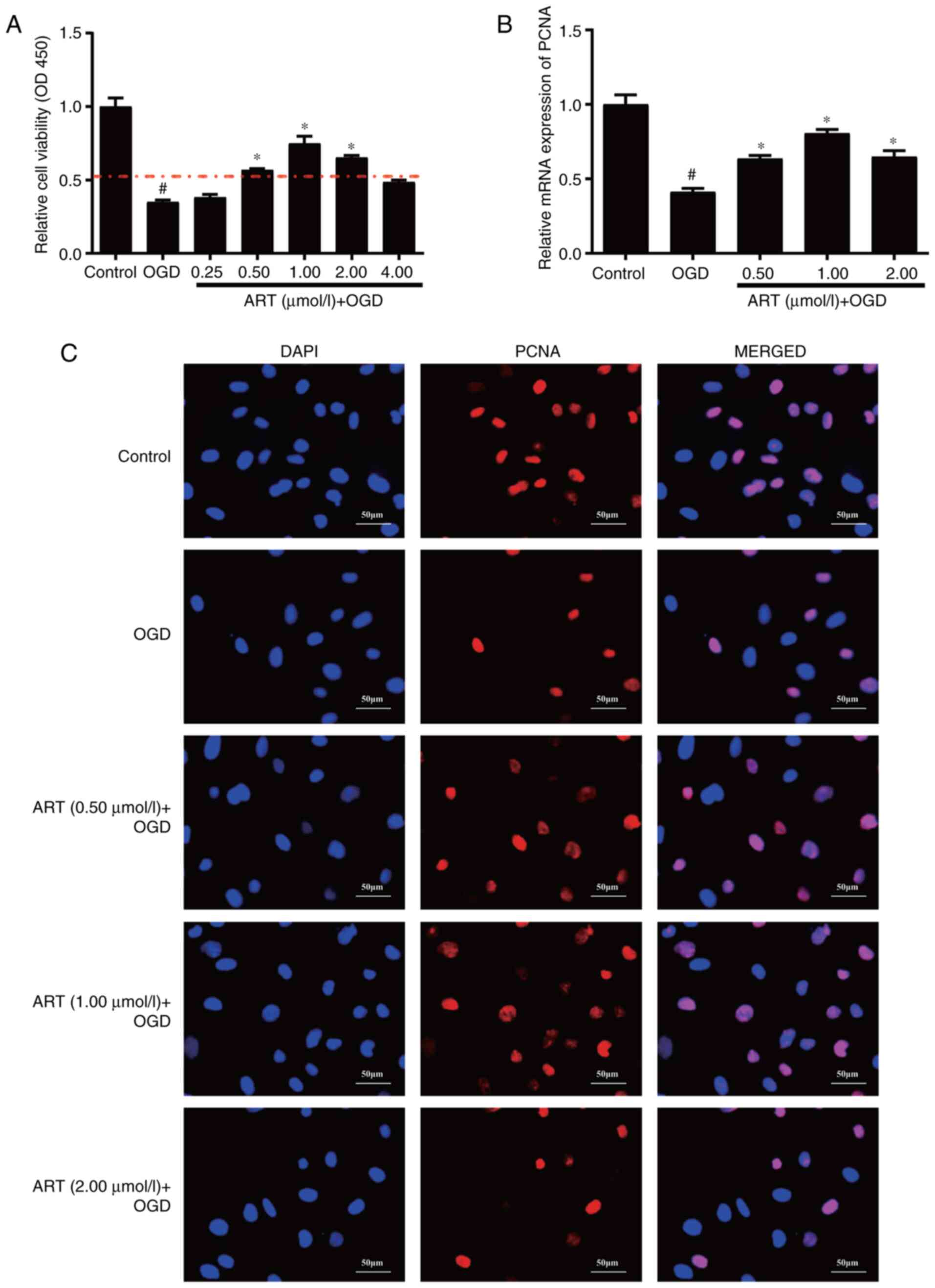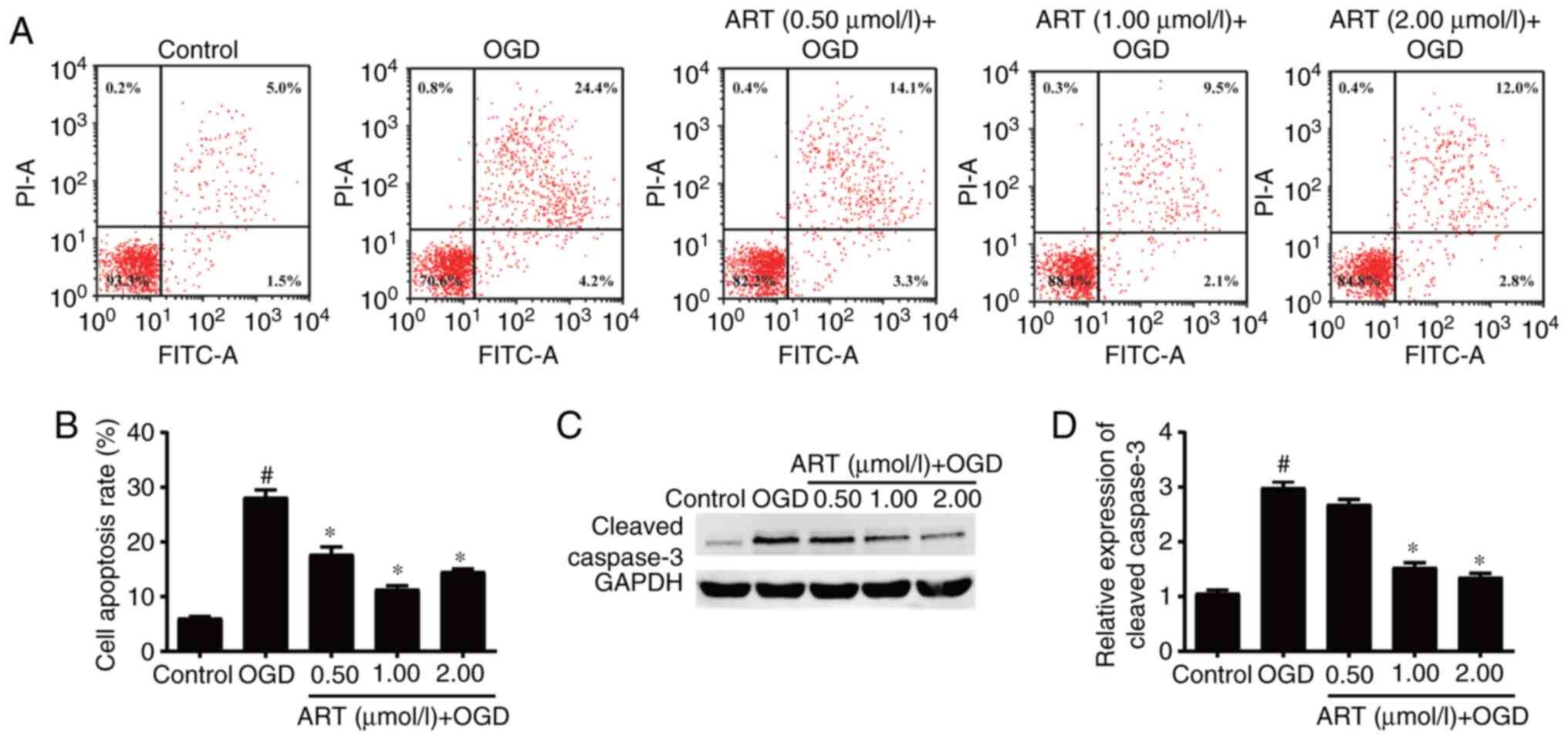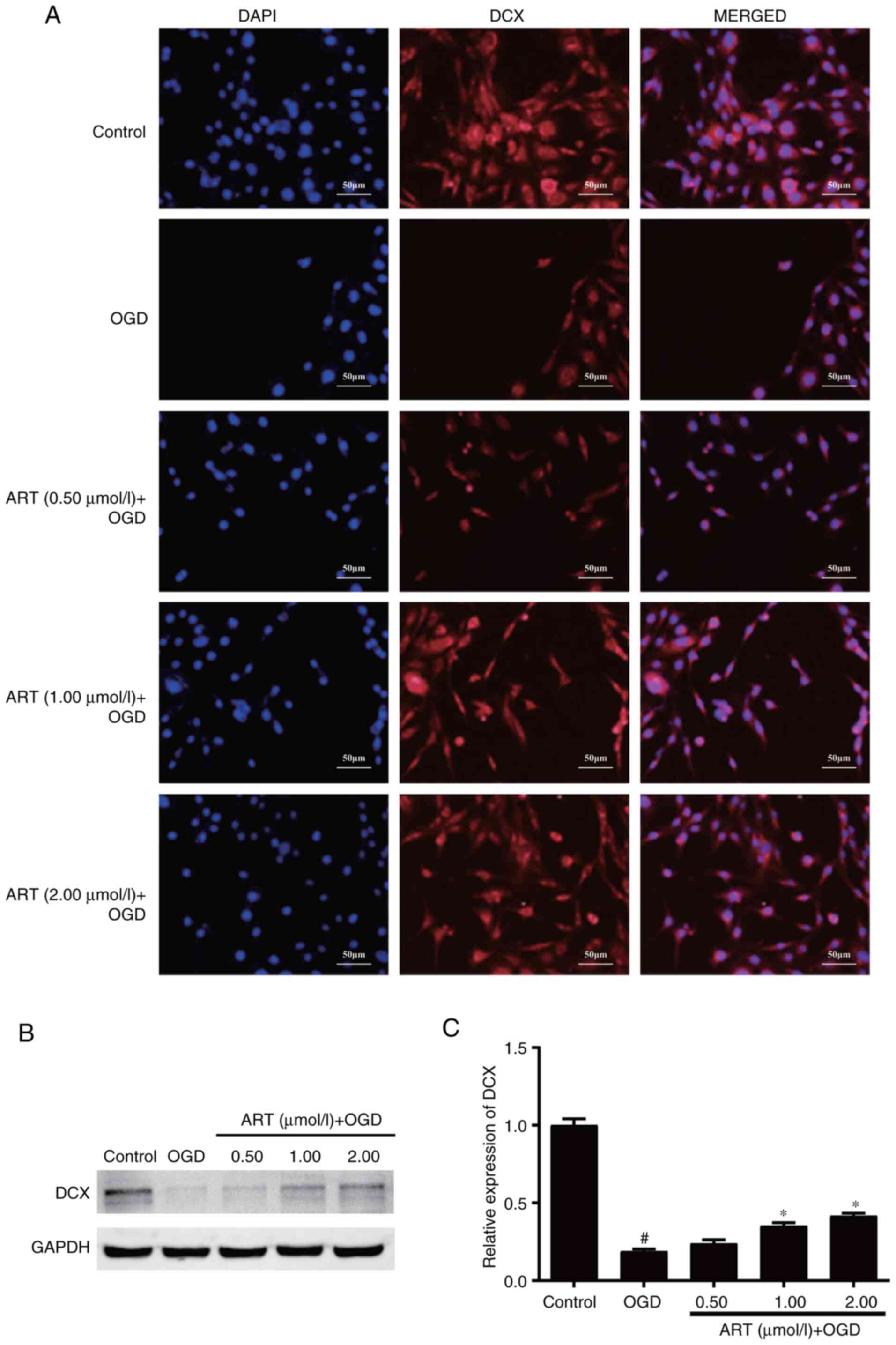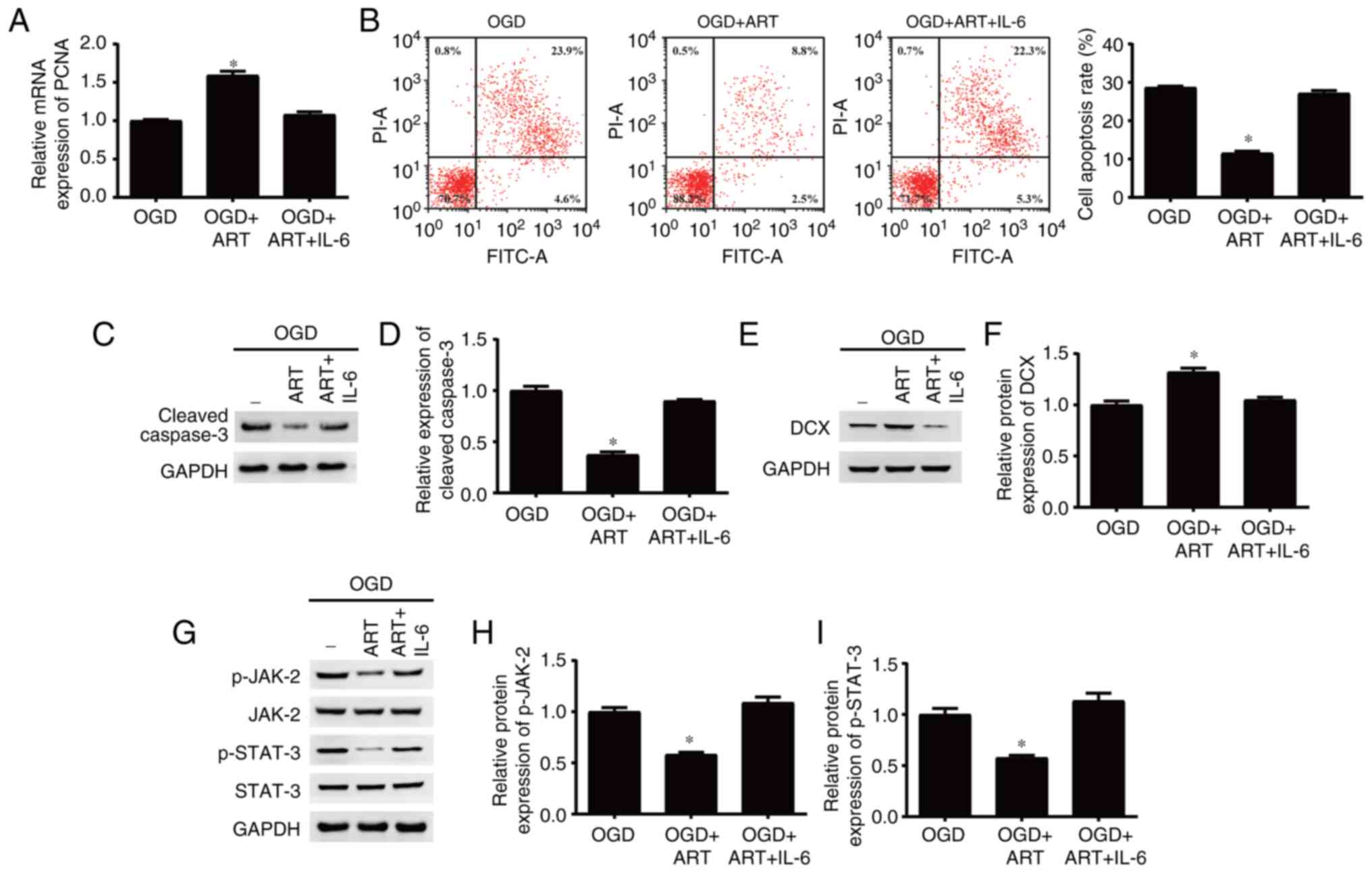|
1
|
Khoshnam SE, Winlow W, Farzaneh M, Farbood
Y and Moghaddam HF: Pathogenic mechanisms following ischemic
stroke. Neurol Sci. 38:1167–1186. 2017.PubMed/NCBI View Article : Google Scholar
|
|
2
|
Conway J and Friedman BW: Aspirin after
acute ischemic stroke. Am Fam Physician. 102(Online)2020.PubMed/NCBI
|
|
3
|
Boese AC, Le QE, Pham D, Hamblin MH and
Lee JP: Neural stem cell therapy for subacute and chronic ischemic
stroke. Stem Cell Res Ther. 9(154)2018.PubMed/NCBI View Article : Google Scholar
|
|
4
|
Wang M, Liang X, Cheng M, Yang L, Liu H,
Wang X, Sai N and Zhang X: Homocysteine enhances neural stem cell
autophagy in in vivo and in vitro model of ischemic stroke. Cell
Death Dis. 10(561)2019.PubMed/NCBI View Article : Google Scholar
|
|
5
|
Bernstock JD, Peruzzotti-Jametti L, Ye D,
Gessler FA, Maric D, Vicario N, Lee YJ, Pluchino S and Hallenbeck
JM: Neural stem cell transplantation in ischemic stroke: A role for
preconditioning and cellular engineering. J Cereb Blood Flow Metab.
37:2314–2319. 2017.PubMed/NCBI View Article : Google Scholar
|
|
6
|
Othman FA and Tan SC: Preconditioning
strategies to enhance neural stem cell-based therapy for ischemic
stroke. Brain Sci. 10(893)2020.PubMed/NCBI View Article : Google Scholar
|
|
7
|
Zhang GL, Zhu ZH and Wang YZ: Neural stem
cell transplantation therapy for brain ischemic stroke: Review and
perspectives. World J Stem Cells. 11:817–830. 2019.PubMed/NCBI View Article : Google Scholar
|
|
8
|
Bernstock JD, Peruzzotti-Jametti L,
Leonardi T, Vicario N, Ye D, Lee YJ, Maric D, Johnson KR, Mou Y,
Van Den Bosch A, et al: SUMOylation promotes survival and
integration of neural stem cell grafts in ischemic stroke.
Ebiomedicine. 42:214–224. 2019.PubMed/NCBI View Article : Google Scholar
|
|
9
|
Spellicy SE, Kaiser EE, Bowler MM,
Jurgielewicz BJ, Webb RL, West FD and Stice SL: Neural stem cell
extracellular vesicles disrupt midline shift predictive outcomes in
porcine ischemic stroke model. Transl Stroke Res. 11:776–788.
2020.PubMed/NCBI View Article : Google Scholar
|
|
10
|
Webb RL, Kaiser EE, Jurgielewicz BJ,
Spellicy S, Scoville SL, Thompson TA, Swetenburg RL, Hess DC, West
FD and Stice SL: Human neural stem cell extracellular vesicles
improve recovery in a porcine model of ischemic stroke. Stroke.
49:1248–1256. 2018.PubMed/NCBI View Article : Google Scholar
|
|
11
|
Kong Z, Liu R and Cheng Y: Artesunate
alleviates liver fibrosis by regulating ferroptosis signaling
pathway. Biomed Pharmacother. 109:2043–2053. 2019.PubMed/NCBI View Article : Google Scholar
|
|
12
|
Adebayo JO, Tijjani H, Adegunloye AP,
Ishola AA, Balogun EA and Malomo SO: Enhancing the antimalarial
activity of artesunate. Parasitol Res. 119:2749–2764.
2020.PubMed/NCBI View Article : Google Scholar
|
|
13
|
Frosch AEP: Artesunate versus quinine:
Keeping our options open. Clin Infect Dis. 70:288–289.
2020.PubMed/NCBI View Article : Google Scholar
|
|
14
|
Jiang F, Zhou JY, Zhang D, Liu MH and Chen
YG: Artesunate induces apoptosis and autophagy in HCT116 colon
cancer cells, and autophagy inhibition enhances the
artesunate-induced apoptosis. Int J Mol Med. 42:1295–1304.
2018.PubMed/NCBI View Article : Google Scholar
|
|
15
|
Li ZJ, Dai HQ, Huang XW, Feng J, Deng JH,
Wang ZX, Yang XM, Liu YJ, Wu Y, Chen PH, et al: Artesunate
synergizes with sorafenib to induce ferroptosis in hepatocellular
carcinoma. Acta Pharmacol Sin. 42:301–310. 2021.PubMed/NCBI View Article : Google Scholar
|
|
16
|
Persaud S, Eid S, Swiderski N, Serris I
and Cho H: Preparations of rectal suppositories containing
artesunate. Pharmaceutics. 12(222)2020.PubMed/NCBI View Article : Google Scholar
|
|
17
|
Walimbwa SI, Lamorde M, Waitt C, Kaboggoza
J, Else L, Byakika-Kibwika P, Amara A, Gini J, Winterberg M, Chiong
J, et al: Drug interactions between dolutegravir and
artemether-lumefantrine or artesunate-amodiaquine. Antimicrob
Agents Chemother. 63:e01310–18. 2019.PubMed/NCBI View Article : Google Scholar
|
|
18
|
Song L, Ge T, Li Z, Sun J, Li G, Sun Y,
Fang L, Ma YJ and Garred P: Artesunate: A natural product-based
immunomodulator involved in human complement. Biomed Pharmacother.
136(111234)2021.PubMed/NCBI View Article : Google Scholar
|
|
19
|
Dang WZ, Li H, Jiang B, Nandakumar KS, Liu
KF, Liu LX, Yu XC, Tan HJ and Zhou C: Therapeutic effects of
artesunate on lupus-prone MRL/lpr mice are dependent on T
follicular helper cell differentiation and activation of JAK2-STAT3
signaling pathway. Phytomedicine. 62(152965)2019.PubMed/NCBI View Article : Google Scholar
|
|
20
|
Zhang K, Yang Y, Ge H, Wang J, Chen X, Lei
X, Zhong J, Zhang C, Xian J, Lu Y, et al: Artesunate promotes the
proliferation of neural stem/progenitor cells and alleviates
Ischemia-reperfusion Injury through
PI3K/Akt/FOXO-3a/p27kip1 signaling pathway. Aging
(Albany NY). 12:8029–8048. 2020.PubMed/NCBI View Article : Google Scholar
|
|
21
|
Livak KJ and Schmittgen TD: Analysis of
relative gene expression data using real-time quantitative PCR and
the 2(-Delta Delta C(T)) method. Methods. 25:402–408.
2001.PubMed/NCBI View Article : Google Scholar
|
|
22
|
Cheng X, Yeung PKK, Zhong K, Zilundu PLM,
Zhou L and Chung SK: Astrocytic endothelin-1 overexpression
promotes neural progenitor cells proliferation and differentiation
into astrocytes via the Jak2/Stat3 pathway after stroke. J
Neuroinflamm. 16(227)2019.PubMed/NCBI View Article : Google Scholar
|
|
23
|
Ilamathi M, Prabu PC, Ayyappa KA and
Sivaramakrishnan V: Artesunate obliterates experimental
hepatocellular carcinoma in rats through suppression of
IL-6-JAK-STAT signalling. Biomed Pharmacother. 82:72–79.
2016.PubMed/NCBI View Article : Google Scholar
|
|
24
|
Ilamathi M, Santhosh S and
Sivaramakrishnan V: Artesunate as an anti-cancer agent targets
Stat-3 and favorably suppresses hepatocellular carcinoma. Curr Top
Med Chem. 16:2453–2463. 2016.PubMed/NCBI View Article : Google Scholar
|
|
25
|
Randolph SA: Ischemic stroke. Workplace
Health Saf. 64(444)2016.PubMed/NCBI View Article : Google Scholar
|
|
26
|
Inatomi Y, Nakajima M, Yonehara T and Ando
Y: Ipsilateral hemiparesis in ischemic stroke patients. Acta Neurol
Scand. 136:31–40. 2017.PubMed/NCBI View Article : Google Scholar
|
|
27
|
Sinden JD, Hicks C, Stroemer P,
Vishnubhatla I and Corteling R: Human neural stem cell therapy for
chronic ischemic stroke: Charting progress from laboratory to
patients. Stem Cells Dev. 26:933–947. 2017.PubMed/NCBI View Article : Google Scholar
|
|
28
|
Yu X, Wang X, Zeng S and Tuo X: Protective
effects of primary neural stem cell treatment in ischemic stroke
models. Exp Ther Med. 16:2219–2228. 2018.PubMed/NCBI View Article : Google Scholar
|
|
29
|
Zhu X, Yan J, Bregere C, Zelmer A, Goerne
T, Kapfhammer JP, Guzman R and Wellmann S: RBM3 promotes
neurogenesis in a niche-dependent manner via IMP2-IGF2 signaling
pathway after hypoxic-ischemic brain injury. Nat Commun.
10(3983)2019.PubMed/NCBI View Article : Google Scholar
|
|
30
|
Knotek T, Janeckova L, Kriska J, Korinek V
and Anderova M: Glia and neural stem and progenitor cells of the
healthy and ischemic brain: The workplace for the Wnt signaling
pathway. Genes (Basel). 11(804)2020.PubMed/NCBI View Article : Google Scholar
|
|
31
|
Gan L, Liao S, Tong Y, Li W, Peng W and
Deng S: Long noncoding RNA H19 mediates neural stem/progenitor
cells proliferation, differentiation and apoptosis through the p53
signaling pathway after ischemic stroke. Biochem Biophys Res
Commun. 597:8–15. 2022.PubMed/NCBI View Article : Google Scholar : (Epub ahead of
print).
|
|
32
|
Lin R, Lang M, Heinsinger N, Stricsek G,
Zhang J, Iozzo R, Rosenwasser R and Iacovitti L: Stepwise
impairment of neural stem cell proliferation and neurogenesis
concomitant with disruption of blood-brain barrier in recurrent
ischemic stroke. Neurobiol Dis. 115:49–58. 2018.PubMed/NCBI View Article : Google Scholar
|
|
33
|
Pandamooz S, Jurek B, Salehi MS, Mostaghel
M, Miyan JA, Dianatpour M and Borhani-Haghighi A: The
implementation of preconditioned epidermal neural crest stem cells
to combat ischemic stroke. Comment on Othman, F.A.; Tan, S.C.
Preconditioning strategies to enhance neural stem cell-based
therapy for ischemic stroke. Brain Sci. 2020, 10, 893. Brain Sci.
11(653)2021.PubMed/NCBI View Article : Google Scholar
|
|
34
|
Heller L, Roepe PD and de Dios AC:
Artesunate activation by heme in an aqueous medium. Inorganica Chim
Acta. 496(119029)2019.PubMed/NCBI View Article : Google Scholar
|
|
35
|
Yao X, Zhao CR, Yin H, Wang K and Gao JJ:
Synergistic antitumor activity of sorafenib and artesunate in
hepatocellular carcinoma cells. Acta Pharmacol Sin. 41:1609–1620.
2020.PubMed/NCBI View Article : Google Scholar
|
|
36
|
Liu Y, Dang W, Zhang S, Wang L and Zhang
X: Artesunate attenuates inflammatory injury and inhibits the NF-κB
pathway in a mouse model of cerebral ischemia. J Int Med Res.
49(3000605211053549)2021.PubMed/NCBI View Article : Google Scholar
|
|
37
|
Zhang C, Liu J, Yuan C, Ji Q, Chen D, Zhao
H, Jiang W, Ma K and Liu L: JAK2/STAT3 is associated with the
inflammatory process in periapical granuloma. Int J Clin Exp
Pathol. 12:190–197. 2019.PubMed/NCBI
|
|
38
|
Park SY, Lee CJ, Choi JH, Kim JH, Kim JW,
Kim JY and Nam JS: The JAK2/STAT3/CCND2 axis promotes colorectal
cancer stem cell persistence and radioresistance. J Exp Clin Cancer
Res. 38(399)2019.PubMed/NCBI View Article : Google Scholar
|
|
39
|
Wu W, Fu J, Gu Y, Wei Y, Ma P and Wu J:
JAK2/STAT3 regulates estrogen-related senescence of bone marrow
stem cells. J Endocrinol. 245:141–153. 2020.PubMed/NCBI View Article : Google Scholar
|
|
40
|
Hou Y, Wang K, Wan W, Cheng Y, Pu X and Ye
X: Resveratrol provides neuroprotection by regulating the
JAK2/STAT3/PI3K/AKT/mTOR pathway after stroke in rats. Genes Dis.
5:245–255. 2018.PubMed/NCBI View Article : Google Scholar
|
|
41
|
Guo X, Shen X and Yong Z: MiR-101 protects
against the cerebral I/R injury through regulating JAK2/STAT3
signaling pathway. Neuropsychiatr Dis Treat. 17:2791–2802.
2021.PubMed/NCBI View Article : Google Scholar
|
|
42
|
Zhong Y, Yin B, Ye Y, Dekhel OYAT, Xiong
X, Jian Z and Gu L: The bidirectional role of the JAK2/STAT3
signaling pathway and related mechanisms in cerebral
ischemia-reperfusion injury. Exp Neurol. 341(113690)2021.PubMed/NCBI View Article : Google Scholar
|
|
43
|
El-Sherbiny M, El-Sayed RM, Helal MA,
Ibrahiem AT, Elmahdi HS, Eladl MA, Bilay SE, Alshahrani AM, Tawfik
MK, Hamed ZE, et al: Nifuroxazide mitigates angiogenesis in
Ehlrich's solid carcinoma: Molecular docking, bioinformatic and
experimental studies on inhibition of Il-6/JAK2/STAT3 signaling.
Molecules. 26(6858)2021.PubMed/NCBI View Article : Google Scholar
|
|
44
|
Qian R, Sibei T, Fan G, Wang B, Yang L, Ma
L and Fu P: Natural flavonol fisetin attenuated hyperuricemic
nephropathy via inhibiting IL-6/JAK2/STAT3 and TGF-β/SMAD3
signaling. Phytomedicine. 87(153552)2021.PubMed/NCBI View Article : Google Scholar
|
|
45
|
Guan X, Wang Q, Liu M, Sun A and Li X:
Possible involvement of the IL-6/JAK2/STAT3 pathway in the
hypothalamus in depressive-like behavior of rats exposed to chronic
mild stress. Neuropsychobiology. 80:279–287. 2021.PubMed/NCBI View Article : Google Scholar
|
|
46
|
Zhao X, Ma W, Li X, Li H, Li J, Li H and
He F: ANXA1 enhances tumor proliferation and migration by
regulating epithelial-mesenchymal transition and IL-6/JAK2/STAT3
pathway in papillary thyroid carcinoma. J Cancer. 12:1295–1306.
2021.PubMed/NCBI View Article : Google Scholar
|
|
47
|
Zhao Y, Luan H, Jiang H, Xu Y, Wu X, Zhang
Y and Li R: Gegen Qinlian decoction relieved DSS-induced ulcerative
colitis in mice by modulating Th17/Treg cell homeostasis via
suppressing IL-6/JAK2/STAT3 signaling. Phytomedicine.
84(153519)2021.PubMed/NCBI View Article : Google Scholar
|



















